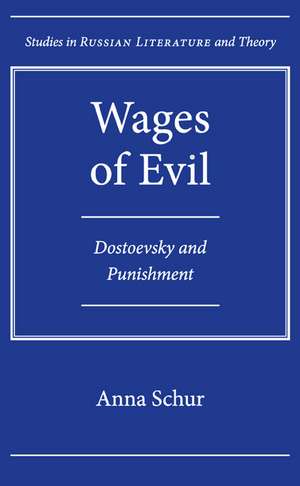Wages of Evil: Dostoevsky and Punishment: Studies in Russian Literature and Theory
Autor Anna Schuren Limba Engleză Hardback – 17 ian 2013
As Dostoevsky attempts to balance the various ethical and cultural imperatives, he displays ambivalence both about punishment and about mercy. This ambivalence, Schur argues, is further complicated by what Dostoevsky sees as the unfathomable quality of the self, which hinders every attempt to match crimes with punishments. The one certainty he holds is that a proper response to wrongdoing must include a concern for the wrongdoer’s moral improvement.
Din seria Studies in Russian Literature and Theory
-
 Preț: 237.65 lei
Preț: 237.65 lei -
 Preț: 347.81 lei
Preț: 347.81 lei -
 Preț: 305.17 lei
Preț: 305.17 lei -
 Preț: 348.47 lei
Preț: 348.47 lei -
 Preț: 347.10 lei
Preț: 347.10 lei -
 Preț: 380.28 lei
Preț: 380.28 lei -
 Preț: 382.19 lei
Preț: 382.19 lei - 18%
 Preț: 919.96 lei
Preț: 919.96 lei - 18%
 Preț: 835.34 lei
Preț: 835.34 lei - 18%
 Preț: 836.15 lei
Preț: 836.15 lei -
 Preț: 354.61 lei
Preț: 354.61 lei -
 Preț: 271.39 lei
Preț: 271.39 lei - 23%
 Preț: 700.68 lei
Preț: 700.68 lei -
 Preț: 183.31 lei
Preț: 183.31 lei - 8%
 Preț: 358.95 lei
Preț: 358.95 lei -
 Preț: 172.79 lei
Preț: 172.79 lei - 8%
 Preț: 322.73 lei
Preț: 322.73 lei - 23%
 Preț: 618.39 lei
Preț: 618.39 lei - 23%
 Preț: 703.58 lei
Preț: 703.58 lei - 12%
 Preț: 270.07 lei
Preț: 270.07 lei - 18%
 Preț: 870.84 lei
Preț: 870.84 lei - 12%
 Preț: 270.07 lei
Preț: 270.07 lei - 13%
 Preț: 410.97 lei
Preț: 410.97 lei -
 Preț: 189.05 lei
Preț: 189.05 lei - 13%
 Preț: 357.48 lei
Preț: 357.48 lei - 23%
 Preț: 706.59 lei
Preț: 706.59 lei - 16%
 Preț: 527.24 lei
Preț: 527.24 lei -
 Preț: 169.95 lei
Preț: 169.95 lei - 18%
 Preț: 838.09 lei
Preț: 838.09 lei - 11%
 Preț: 230.59 lei
Preț: 230.59 lei - 18%
 Preț: 837.09 lei
Preț: 837.09 lei - 13%
 Preț: 265.93 lei
Preț: 265.93 lei - 18%
 Preț: 835.94 lei
Preț: 835.94 lei - 18%
 Preț: 695.91 lei
Preț: 695.91 lei - 9%
 Preț: 357.55 lei
Preț: 357.55 lei -
 Preț: 287.13 lei
Preț: 287.13 lei - 9%
 Preț: 356.12 lei
Preț: 356.12 lei - 14%
 Preț: 230.32 lei
Preț: 230.32 lei - 39%
 Preț: 158.33 lei
Preț: 158.33 lei - 14%
 Preț: 186.68 lei
Preț: 186.68 lei - 8%
 Preț: 358.87 lei
Preț: 358.87 lei - 23%
 Preț: 787.13 lei
Preț: 787.13 lei - 10%
 Preț: 236.57 lei
Preț: 236.57 lei - 23%
 Preț: 783.95 lei
Preț: 783.95 lei
Preț: 358.31 lei
Preț vechi: 1019.58 lei
-65% Nou
Puncte Express: 537
Preț estimativ în valută:
68.56€ • 73.32$ • 57.17£
68.56€ • 73.32$ • 57.17£
Carte indisponibilă temporar
Doresc să fiu notificat când acest titlu va fi disponibil:
Se trimite...
Preluare comenzi: 021 569.72.76
Specificații
ISBN-13: 9780810128484
ISBN-10: 0810128489
Pagini: 256
Dimensiuni: 156 x 235 x 23 mm
Greutate: 0.51 kg
Ediția:First Edition
Editura: Northwestern University Press
Colecția Northwestern University Press
Seria Studies in Russian Literature and Theory
ISBN-10: 0810128489
Pagini: 256
Dimensiuni: 156 x 235 x 23 mm
Greutate: 0.51 kg
Ediția:First Edition
Editura: Northwestern University Press
Colecția Northwestern University Press
Seria Studies in Russian Literature and Theory
Notă biografică
ANNA SCHUR is a professor of English at Keene State College in New Hampshire.
Cuprins
IntroductionChapter 1: The Scaffold and the Rod: Dostoevsky on the Death Penalty and Corporal PunishmentChapter 2 : "Squaring the Circle": The Justice of PunishmentChapter 3: Foregoing Punishment: Dostoevsky’s Third Category and the Case of Ekaterina KornilovaChapter 4: "A Mummy" or a "Resurrected" Self?Chapter 5: "India Rubber," the "Living Soul," and the Process of Moral Change
Chapter 6: Approximations of Justice: The Novel in the Courtroom
Afterword
Notes
Bibliography
Afterword
Notes
Bibliography
Recenzii
"More than groundbreaking, the book is a splendid piece of work. Exhaustively researched and lucidly written, it should appeal not only to Russian specialists and literary scholars but to the general reader with any interest in the ethical, psychological, legal, sociological, or criminological aspects of the punishment of those found guilty of crimes." —James P. Scanlan, Slavic Review
"The balance and rigour Schur brings to the subject are to be welcomed . . . Wages of Evil reveals the complexities in Dostoevskii’s position, and the hesitations (a key trope for Schur) and reversals that are apparent as he wrestles with the problem, presenting a picture that is a far cry from the dogmatic Orthodox moralist that sometimes emerges in studies of the author. As much as in its engagement with the specifics of the question of punishment, Schur’s contribution lies in her nuanced approach, and for this she should be applauded." —Modern Language Review
“An excellent study of Dostoevsky’s journalistic and fictional meditations on punishment.” —Aaron Weinacht, The Russian Review
Descriere
Anna Schur incorporates sources from philosophy, criminology, psychology, and history to argue that Dostoevsky’s thinking was shaped not only by his Christian ethics but also by the debates on punishment theory and practice unfolding during his lifetime.
